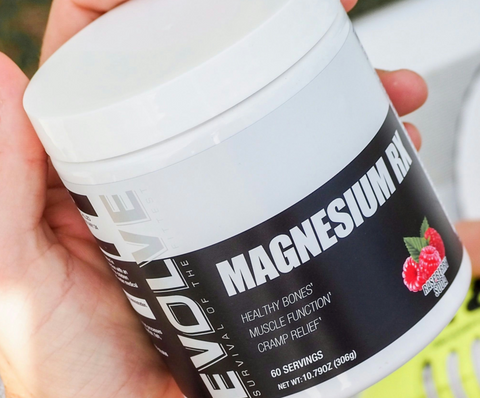Let’s tackle one of the hottest topics in nutrition right now: magnesium. Everyone from influencers raving about supplements, to ads touting its sleep-enhancing properties, or perhaps articles linking it to stress relief and enhancement of overall wellbeing. But, is it the real deal – or is this just another fleeting health craze trend, destinated to end up the way of celery juice and ab rollers…or is it as vital as everyone says? Let’s dive in.
So, why the Hype?
Magnesium is a mineral that plays a key role in over 300 biochemical reactions in your body. As well as supporting muscle function and nerve health, it’s responsible for maintaining steady blood pressure and regulating sleep. It’s often the unsung hero of our daily bodily functions.
It would seem that the recent surge in magnesium awareness principally stems from studies linking its deficiency to stress, sleep disturbances, and conditions such as anxiety and depression. And, in a world where chronic stress and poor sleep are almost a given, it’s hardly any wonder that magnesium is very much having its moment.
The benefits of magnesium
You sleep better
Magnesium helps regulate melatonin, that all-important hormone that controls your sleep-wake cycle. In addition, it also has a calming effect on your nervous system by activating the parasympathetic “rest and digest” system.
It reduces stress
If you’re feeling strung out, then magnesium can help with that - it helps regulate cortisol (the stress hormone) and supports GABA, a neurotransmitter that promotes relaxation.
It supports muscle recovery and performance
For all those athletes out there, take note: magnesium helps relax muscles and prevent cramping. It’s also key for energy production, so it makes it a great ally for workouts and recovery, too.
It’s great for healthy hearts
Magnesium not only helps to regulate blood pressure, but it improves heart rhythm, and it reduces the risk of cardiovascular issues.
It aids bone health
While calcium gets all the plaudits in this arena, magnesium is also essential for maintaining bone density and strength.
The big question: are we getting enough of it?
Perhaps to no great surprise: many people don’t. In fact, studies indicate that up to 50% of the population doesn’t don’t take the recommended daily intake. Mostly, this is due to modern diets, which are often low in magnesium-rich foods like leafy greens, nuts, seeds, and whole grains.
And on top of that, aspects such as stress, alcohol consumption, and certain medications (e.g. diuretics and proton pump inhibitors) can deplete magnesium levels in the body.
Natural sources of magnesium
The good news is, if you want to boost your magnesium intake naturally, there are some excellent sources, such as:
- Leafy greens - kale and spinach are great examples
- Nuts and seeds - the likes of almonds, cashews, and pumpkin seeds
- Legumes - such as black beans and chickpeas
- Whole grains – brown rice and oats are the highlights here
- Dark chocolate – oh, hello…70% cacao or higher is best
- Fatty, oily fish - salmon and mackerel
Should you take supplements?
Ideally, you’ll consume your vitamins and minerals in that wonderful balanced diet you have every day, right? If you’re eating a balanced diet, you may already be getting enough magnesium, so well done you. There’s a strong chance though, that this isn’t the case, and if you experience symptoms like muscle cramps, poor sleep, or constant fatigue, then taking supplements might help.
Types of magnesium supplement
There’s not just one type of magnesium, oh no – there are, in fact, several types, each with specific benefits:
- Magnesium citrate: good for constipation and general use
- Magnesium glycinate: Great to help relaxation and your sleep
- Magnesium oxide: more often than not used for digestion issues
- Magnesium threonate: positive for cognitive benefits and brain health
Remember, the dosage matters
The Recommended Dietary Allowance (RDA) for adults is in the region of 310–420 mg per day, but this will depend on your age and gender. However, be aware that taking too much can cause the not pleasant side effects of the likes of diarrhoea or stomach upsets. As with all new supplements, it’s advisable to always start with a lower dose and, if in any doubt, consult a healthcare professional.
Magnesium: myths v facts
OK, let’s clear up some confusion:
“More is always better.” In this case, definitely not true – an excess of magnesium can lead to toxicity, especially from supplements
“Magnesium cures anxiety.” For sure, it can help manage symptoms, but it’s not a standalone cure
“You can’t get enough from food alone.” Sorry, also not true – it really depends on your diet, and it can be difficult depending on what you're eating, but many people can meet their needs naturally.
OK, so it's it a fad then, right?
Well, unlike some fleeting trends in wellness (remember when stuff like celery juice was the cure all?), to be fair, magnesium is no fad: its benefits are backed by robust science, and its role in health is fundamental. Having said that, it’s not the elixir of life or some magic bullet. Magnesium won’t erase poor sleep habits or a stressful lifestyle, but it can be a valuable piece of the puzzle to good health.
So, in summary…
- Magnesium is essential for overall health, and many people could benefit from increasing their intake
- It’s better to focus on magnesium-rich foods before reaching for a supplement
- If you do decide to take supplements, choose the right type for your needs and stick to recommended doses – don’t be tempted to load up
- If you can, pair magnesium with a healthy lifestyle to get the best results
The bottom line? There’s more than just hype to magnesium - it’s a cornerstone of good health. So, whether you’re looking to sleep better, recover faster, or simply feel more balanced, then it deserves a spot on your radar.




